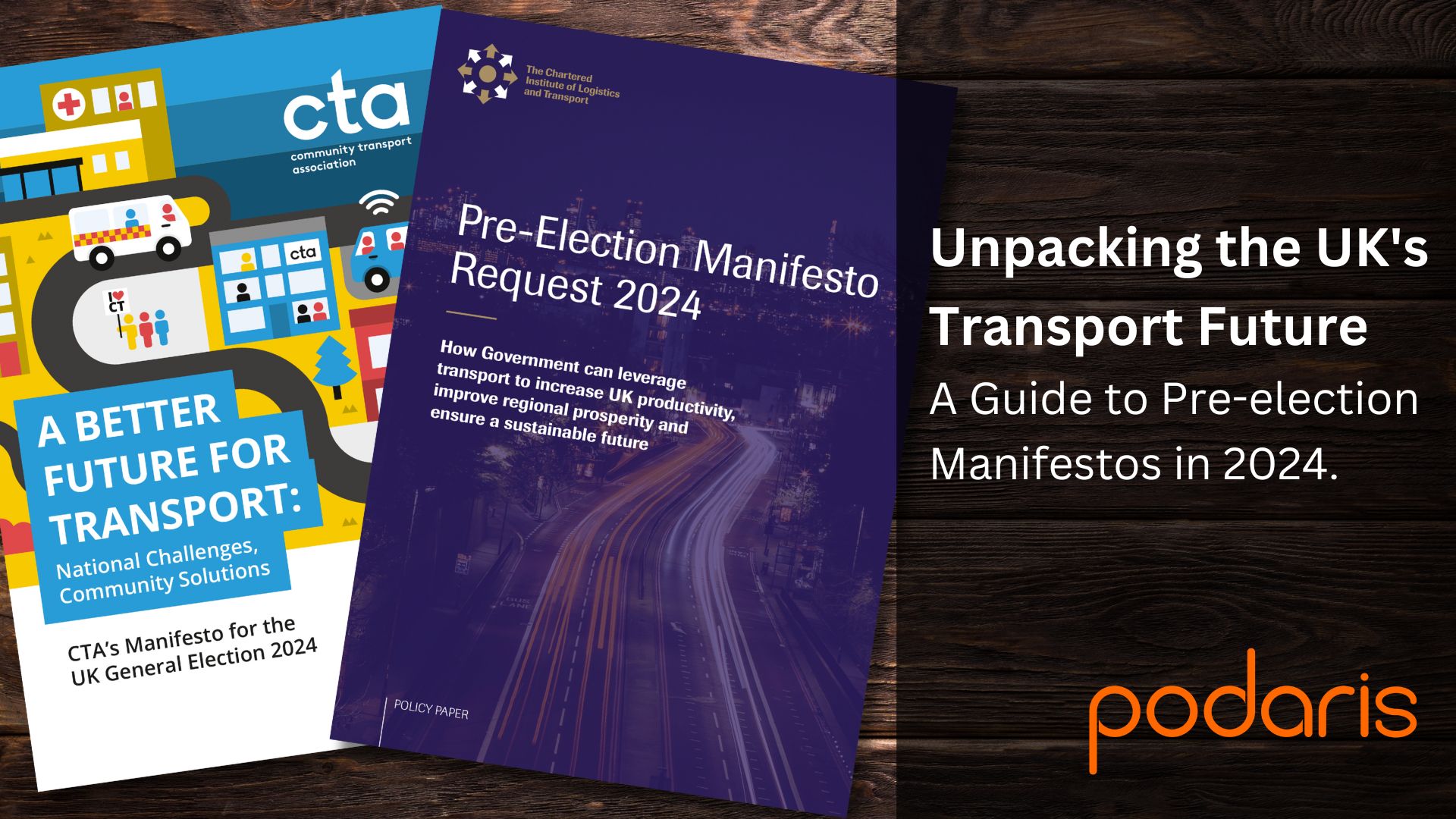
In the run up to the next UK General Election, a number of UK transport organisations have recently taken the initative of publishing their manifestos - each their own effort to shape transport policy towards better outcomes for society and the country.
Across the board, key targets like sustainablity, equitable access and a commitment to net zero are called out as being at the heart of progressive policy. We take a look at three manifestos and break down the key talking points for transport professionals.
The CILT Pre-election Manifesto Request 2024
The Chartered Institute of Logistics and Transport's (CILT) Pre-election Manifesto Request 2024 comprises six topics that form a vision of how well designed transport networks can be “engines of opportunity”.
These are, in summary:
-
Money - CILT advocates for “long-term, stable [financial] commitments” in order for people and businesses to be able to confidently plan their futures.
-
Planning - Linking new developments with resilient and sustainable transport improvements.
-
Inclusion - Better training for transport professionals and identifying gaps in accessible journeys.
-
Local Decision Making - Local people should be given responsibility for decisions about local transport issues.
-
Net Zero - Rail, bus and coach electrification should be encouraged, as should active travel.
-
Skills - New skills and training should be developed as electrification is promoted.
CILT also lay out a 6 point programme for a new Government's first 18 months, broadly summarised as:
-
Local decision-makers should ensure roads help people (particularly the elderly and disabled people) live, work and socialise. Active travel and public transport will be key.
-
Set out a change to road taxation policy that helps congestion.
-
Revise national policy around transport (including road and rail) to align current needs and future aspirations.
-
Provide support for operators and authorities to work together to enhance bus and rail in order to connect people with opportunities.
-
Implement GB Railways and introduce rail ticket reform.
-
Incentivise private sector funded rail freight and prioritise its electrification.
The Community Transport Association's Manifesto for the UK General Election 2024
The Community Transport Association (CTA) also published a compelling, highly visual manifesto supported by testimonials earlier this year, advocating for a transport system that is inclusive, sustainable, and meets the needs of all communities. Here are the key points from their manifesto:
-
Modernising for Growth: CTA calls for a modern regulatory framework, and invites the next Government to create high-quality accessibility training for public transport drivers, and invest in Community Transport's data and digital capacity (including Digital Demand Responsive Transport, Mobility as a Service and connected/autonomous vehicles).
-
Health & Social Care Access: Emphasising the role of Community Transport in healthcare, the manifesto discusses the need for a more joined up, strategic and long-term approach to transport to and from healthcare, and the need for Transport Coordinator roles to ensure everyone has affordable, fair and sustainable access to NHS services and sites.
-
Investing in Community Solutions: The manifesto highlights the need to deliver funding for the Community Transport sector, and ensure Community Transport is part of key government schemes such as Bus Service Improvement Plans and the £2 bus fare cap.
-
Climate Action & Volunteer Support: CTA advocates for investment in zero-emission fleets and community-led climate initiatives, alongside a fair deal for volunteers, who are essential for the operation of Community Transport services.
The Transport Planning Society's General Election Manifesto
The Transport Planning Society (TPS) has outlined a comprehensive manifesto for the upcoming General Election, emphasising the need for a transport sector that creates a sustainable, equitable, and prosperous society. Their manifesto breaks down to the following key points:
-
National Transport Strategy: Advocates for a comprehensive strategy to integrate transport policy with land-use planning, prioritise sustainable, multimodal travel, and maintain the UK’s leadership in transitioning to net zero.
-
Integrated Public Transport: TPS calls for a seamless, reliable, and affordable public transport system, with devolved powers and funding to local government, simpler fares, more accessible public transport networks and the establishment of Great British Railways to unify the rail network.
-
Active Travel Investment: Emphasises th need for substantial, long-term funding for active travel to support local infrastructure, the improvement of public spaces, and public awareness campaigns on the health, environmental and economic benefits of active travel.
-
Traffic Reduction Targets: Suggests reviewing road-building plans, implementing road user charging in cities, and considering the benefits of strategies such as Low-Traffic Neighbourhoods and “15-minute cities”
-
Low-Emission Vehicles: Encourages the switch to low-emission vehicles while avoiding over-reliance on technology, and suggests financial incentives and policies to support this transition.